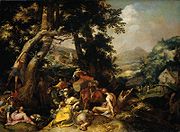
Matthew 3:9
Encyclopedia

Gospel of Matthew
The Gospel According to Matthew is one of the four canonical gospels, one of the three synoptic gospels, and the first book of the New Testament. It tells of the life, ministry, death, and resurrection of Jesus of Nazareth...
in the New Testament
New Testament
The New Testament is the second major division of the Christian biblical canon, the first such division being the much longer Old Testament....
. The verse occurs in where John the Baptist
John the Baptist
John the Baptist was an itinerant preacher and a major religious figure mentioned in the Canonical gospels. He is described in the Gospel of Luke as a relative of Jesus, who led a movement of baptism at the Jordan River...
is berating the Pharisees
Pharisees
The Pharisees were at various times a political party, a social movement, and a school of thought among Jews during the Second Temple period beginning under the Hasmonean dynasty in the wake of...
and Sadducees
Sadducees
The Sadducees were a sect or group of Jews that were active in Ancient Israel during the Second Temple period, starting from the second century BC through the destruction of the Temple in 70 AD. The sect was identified by Josephus with the upper social and economic echelon of Judean society...
. He has previously called them a brood of vipers and warned them of the wrath to come and has urged them to repent. In this verse he warns that their links to Abraham
Abraham
Abraham , whose birth name was Abram, is the eponym of the Abrahamic religions, among which are Judaism, Christianity and Islam...
will not save them
In the King James Version of the Bible the text reads:
- And think not to say within yourselves,
- We have Abraham to our father: for I
- say unto you, that God is able of these
- stones to raise up children unto Abraham.
The World English Bible
World English Bible
The World English Bible is a public domain translation of the Bible that is currently in draft form. Work on the World English Bible began in 1997 and was known as the American Standard Version 1997...
translates the passage as:
- Don't think to yourselves, ‘We have
- Abraham for our father,’ for I tell
- you that God is able to raise up
- children to Abraham from these stones.
For a collection of other versions see BibRef Matthew 3:9
France does not believe that John the Baptist was attacking them for their reliance on bloodlines, rather he sees the phrase "Abraham for our father" as a reference to the exalted position within the political and religious hierarchy that the Pharisees
Pharisees
The Pharisees were at various times a political party, a social movement, and a school of thought among Jews during the Second Temple period beginning under the Hasmonean dynasty in the wake of...
and Sadducees
Sadducees
The Sadducees were a sect or group of Jews that were active in Ancient Israel during the Second Temple period, starting from the second century BC through the destruction of the Temple in 70 AD. The sect was identified by Josephus with the upper social and economic echelon of Judean society...
felt would guarantee their salvation. This links with the overall theme of John's preaching that true repentance is the only path to salvation. Jesus uses the same reference to attack hypocrites in Matthew 8:11-12.
A second interpretation is that John is rejecting the then popular notion of "merits of the fathers" or Zekhut Avot. This principle was that because of the righteousness of Abraham and the other patriarchs, all Jews were now the chosen people and could count on goodwill from God. John is saying that no such lineage would save them from judgement. The reference to creating new children of Abraham out of stone is an illustration of God's omnipotence and that he has no need for his current worshipers.
The "raising up of children to Abraham from these stones" is generally seen as wordplay as in Hebrew the word for stones is abanim and children is banin. France also believes the line is a reference to Isaiah 51:1-2 which calls Abraham "the rock from which you were hewn."

